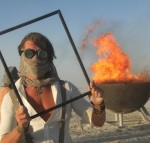This piece is part 2 of a 2 part series on Science and the Mystery of the Unknown. The series begins with Hic Sunt Dracones.
Familiarity and complacency obscure wonder. Here is a mental exercise: consider your cellphone. If you told someone from 1993 that you have a pocket-sized device more powerful than any computer of their time, capable of instantly accessing the entire database of human knowledge, and that you mostly use it to play games and take pictures of food, it is unlikely that they would believe you. Seeing the phone, they would be amazed at its sleekness, its weight, its speed, etc. To someone from 1913, this same phone would seem unbelievable, well beyond anything that H.G. Wells or Jules Verne could imagine. To someone from 1813, it would seem magical. Showing your phone to someone from 1713 would probably result in you being burned at the stake.
Yet, for all the wonder that your phone would inspire in someone from two decades ago, how often have you paused and marvelled at it? It is a common thing and has no mystery to it, right? I recently almost dropped mine into the toilet. Not much mystery to something that you’d drop into the toilet.
But how many of us understand the science behind a smartphone? The microprocessor, the software, the cellular technology, the alloy chemistry? If you actually pause and think about the incredible sum of human experience, ingenuity, and the vast network of supply behind your almost obsolete iPhone 5, it would be hard to not feel a sense of awe. Try to look at it as if you’re seeing it for the first time. Try to grasp the immensity of the know-how and the know-why involved in it, the entirety of which you could never understand. If that does not fill you with wonder, you’re either very brilliant or very obtuse.
And it’s not just phones. Contemplate the magnitude and breadth of human achievements. We are awe-struck by the scale Burj Dubai or the Three Gorges Dam, but even the plainest of highway overpasses is a miracle of progress and construction. The thirst for the newest and the greatest ultimately means that we too quickly get used to everything. Objects entering into our daily lives lose their ability to instil us with wonder, and so our experience is infinitely dulled through the encounter with the quotidian.
Yet, nothing changes within the objects themselves; it is only our perception of them. If we can find a way to make these objects appear awesome again (not “awesome” like a double bacon cheeseburger, but “awesome” in the old meaning of the word – “awe inspiring”) then we would see that rather than taking away the mystery, science has filled our world with “objects more mysterious and magical that any that have hitherto existed”. What about the greater mysteries of the Universe, things such as God, Heaven and Hell, and the fate of socks that get lost in the dryer? Some complain that science strives to deflate these mysteries and reduces us to a mechanical and predictable universe devoid of wonder. But such complaints only betray the ignorance of the complainants. You want wonder? Contemplate the dizzying vastness of the Universe, the great cosmic dance of the galaxies and atoms, the marvellous architecture that fills the infinite expanse of space and time. Not a fan of contemplating? Read up on quantum physics and the many of its astounding implications that defy our imagination. Or consider the staggering complexity and simplicity of life’s progress. For those disinclined to reading, I highly recommend an excellent (albeit often tending to the dramatic) series called “Through the Wormhole”. The whole series is available on YouTube and it’s narrated by Morgan Freeman. What else can you want?
None of the above means that we ought to forsake the mundane existence and let the glory of the Universe sweep us to Burning Man with a bag full of LSD in our pocket. But do behold the wonder and let the soft apprehension of the way it permeates the world inform the regular lives we lead. Japanese aesthetics has a term “Yūgen”, which can be said to mean “a subtle, profound, mysterious sense of the beauty of the universe”. I think we could all use a bit more of that in our lives.
If there is one thing that science has done, it has exposed us to an infinite universe of the wonderful and the unknown. Yes, there is much that we know, and we can marvel at the truths that we already understand, but this is only a mere drop in the ocean. By understanding how little we know, we begin to comprehend the vastness of our ignorance and face new, much greater mysteries. Rather than chasing the dragons from the margins of the maps, science has drawn new maps full of mysterious leviathans that we are only now beginning to apprehend.
The mystery is all around us. All that we need to do is open ourselves to it.





